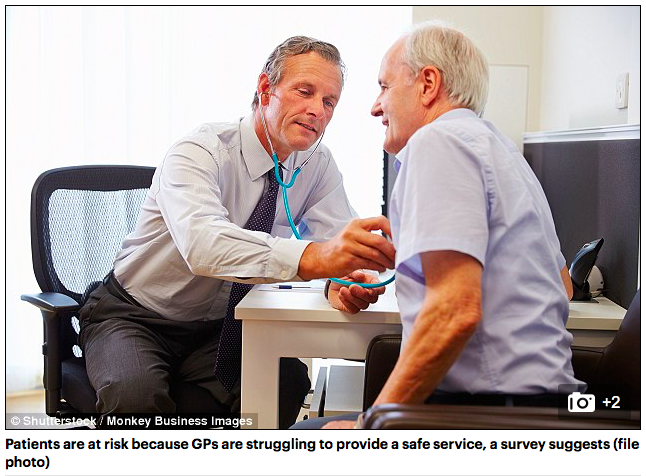Only one in ten doctors say they offer ‘safe’ care: GPs say their workload is affecting the quality of care
 Patients are at risk because GPs are struggling to provide a safe service, a survey will show today.
Patients are at risk because GPs are struggling to provide a safe service, a survey will show today.
The poll of 5,025 British Medical Association members found that 84 per cent believe their workload is affecting care quality. Only one in ten think they can offer a safe service.
Doctors claim they are not being given enough funding to meet the needs of the rising and ageing population.
Surgeries are also facing a recruitment crisis, with up to a third of GPs planning to retire or quit in the next five years. One in eight posts is now empty with many doctors heading abroad and too few being trained.
Waiting times for appointments are at their worst on record and patients are routinely told there are no slots for the next three to four weeks.
The 111 helpline was supposed to reduce the burden but that partially backfired when undertrained call handlers sent too many people to A&E instead.
Dr Chaand Nagpaul, chairman of the BMA GPs committee, said last night: 'We cannot continue to have a service that cannot deliver a safe and effective level of care to the public.
'This major survey of more than 5,000 GPs in England demonstrates that GP practices across the country are struggling to provide safe, high-quality patient care because of unmanageable workload.
'Many practices are being overwhelmed by rising patient demand, contracting budgets and staff shortages which has left them unable to deliver enough appointments and the specialist care many patients need.
'Addressing the crisis in general practice requires a clear strategy that tackles the numerous problems undermining GP services.
'We need an urgent expansion of the workforce in both practices and community-based teams, with GPs calling for an increased number of nurses to look after housebound patients and mental health workers to cope with growing demand in this area.
'Better information for patients about how to safely self-care and wider funding increases for general practice are also needed.'
Professor Helen Stokes-Lampard, chairman of the Royal College of GPs, backed the BMA and told of crippling workloads.
She said: 'The relentlessness of the workload in general practice is a threat to our own health and our patients' safety. GPs will see a total of 1.3million patients today alone, and rising patient demand means GPs are carrying out more consultations than ever before – currently 370million a year and 60million more per year than even five years ago.'
Earlier this month, the head of the NHS, Simon Stevens, tried another tactic to reduce the pressures on GPs: asking patients with a sore throat to go to pharmacies instead.
He announced the roll-out of an instant test in pharmacies that would tell patients with sore throats– a major source of GP visits – whether they needed antibiotics or could go home without medication.
But even that is unlikely to ease pressure to the extent needed.
Although GPs benefited from a new contract ten years ago that led to average salaries soaring to more than £100,000 a year – and enabled them to give up out-of-hours work – morale is at an all-time low.
A Department of Health spokesman said last night: 'We are investing in primary care precisely to relieve pressure on the front line, which will improve patient safety – with an extra £2.4billion of funding, 5,000 more doctors in general practice and 1,500 more pharmacists in surgeries by 2020.
'We're expanding the workforce so well-resourced GPs can give even higher standards of care.'
Source: http://www.dailymail.co.uk/












